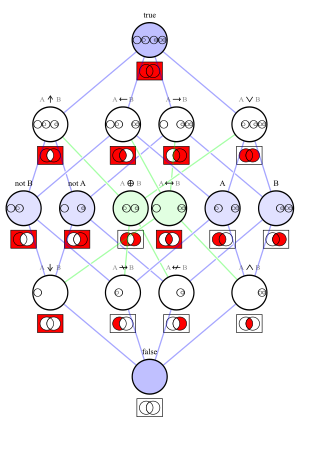
In logic, disjunction, also known as logical disjunction or logical or or logical addition or inclusive disjunction, is a logical connective typically notated as and read aloud as "or". For instance, the English language sentence "it is sunny or it is warm" can be represented in logic using the disjunctive formula , assuming that abbreviates "it is sunny" and abbreviates "it is warm".

In logic, mathematics and linguistics, and is the truth-functional operator of conjunction or logical conjunction. The logical connective of this operator is typically represented as or or (prefix) or or in which is the most modern and widely used.

In logic, a logical connective is a logical constant. Connectives can be used to connect logical formulas. For instance in the syntax of propositional logic, the binary connective can be used to join the two atomic formulas and , rendering the complex formula .
In a computer language, a reserved word is a word that cannot be used as an identifier, such as the name of a variable, function, or label – it is "reserved from use". This is a syntactic definition, and a reserved word may have no user-defined meaning.

This page is a glossary of library and information science.

The Entrez Global Query Cross-Database Search System is a federated search engine, or web portal that allows users to search many discrete health sciences databases at the National Center for Biotechnology Information (NCBI) website. The NCBI is a part of the National Library of Medicine (NLM), which is itself a department of the National Institutes of Health (NIH), which in turn is a part of the United States Department of Health and Human Services. The name "Entrez" was chosen to reflect the spirit of welcoming the public to search the content available from the NLM.

In computer science, the Boolean is a data type that has one of two possible values which is intended to represent the two truth values of logic and Boolean algebra. It is named after George Boole, who first defined an algebraic system of logic in the mid 19th century. The Boolean data type is primarily associated with conditional statements, which allow different actions by changing control flow depending on whether a programmer-specified Boolean condition evaluates to true or false. It is a special case of a more general logical data type—logic does not always need to be Boolean.
In text retrieval, full-text search refers to techniques for searching a single computer-stored document or a collection in a full-text database. Full-text search is distinguished from searches based on metadata or on parts of the original texts represented in databases.
In text processing, a proximity search looks for documents where two or more separately matching term occurrences are within a specified distance, where distance is the number of intermediate words or characters. In addition to proximity, some implementations may also impose a constraint on the word order, in that the order in the searched text must be identical to the order of the search query. Proximity searching goes beyond the simple matching of words by adding the constraint of proximity and is generally regarded as a form of advanced search.
The computer programming languages C and Pascal have similar times of origin, influences, and purposes. Both were used to design their own compilers early in their lifetimes. The original Pascal definition appeared in 1969 and a first compiler in 1970. The first version of C appeared in 1972.

In SQL, null or NULL is a special marker used to indicate that a data value does not exist in the database. Introduced by the creator of the relational database model, E. F. Codd, SQL null serves to fulfill the requirement that all true relational database management systems (RDBMS) support a representation of "missing information and inapplicable information". Codd also introduced the use of the lowercase Greek omega (ω) symbol to represent null in database theory. In SQL, NULL is a reserved word used to identify this marker.

A search engine is a software system that provides hyperlinks to web pages and other relevant information on the Web in response to a user's query. The user inputs a query within a web browser or a mobile app, and the search results are often a list of hyperlinks, accompanied by textual summaries and images. Users also have the option of limiting the search to a specific type of results, such as images, videos, or news.
In computer science, phrase searching allows users to retrieve content from information systems that contains a specific order and combination of words defined by the user.
In information retrieval, an index term is a term that captures the essence of the topic of a document. Index terms make up a controlled vocabulary for use in bibliographic records. They are an integral part of bibliographic control, which is the function by which libraries collect, organize and disseminate documents. They are used as keywords to retrieve documents in an information system, for instance, a catalog or a search engine. A popular form of keywords on the web are tags, which are directly visible and can be assigned by non-experts. Index terms can consist of a word, phrase, or alphanumerical term. They are created by analyzing the document either manually with subject indexing or automatically with automatic indexing or more sophisticated methods of keyword extraction. Index terms can either come from a controlled vocabulary or be freely assigned.
A database search engine is a search engine that operates on material stored in a digital database.
In Internet marketing, search advertising is a method of placing online advertisements on web pages that show results from search engine queries. Through the same search-engine advertising services, ads can also be placed on Web pages with other published content.
A concept search is an automated information retrieval method that is used to search electronically stored unstructured text for information that is conceptually similar to the information provided in a search query. In other words, the ideas expressed in the information retrieved in response to a concept search query are relevant to the ideas contained in the text of the query.
Compound-term processing, in information-retrieval, is search result matching on the basis of compound terms. Compound terms are built by combining two or more simple terms; for example, "triple" is a single word term, but "triple heart bypass" is a compound term.
The syntax of the SQL programming language is defined and maintained by ISO/IEC SC 32 as part of ISO/IEC 9075. This standard is not freely available. Despite the existence of the standard, SQL code is not completely portable among different database systems without adjustments.
In mathematics and mathematical logic, Boolean algebra is a branch of algebra. It differs from elementary algebra in two ways. First, the values of the variables are the truth values true and false, usually denoted 1 and 0, whereas in elementary algebra the values of the variables are numbers. Second, Boolean algebra uses logical operators such as conjunction (and) denoted as ∧, disjunction (or) denoted as ∨, and negation (not) denoted as ¬. Elementary algebra, on the other hand, uses arithmetic operators such as addition, multiplication, subtraction, and division. Boolean algebra is therefore a formal way of describing logical operations in the same way that elementary algebra describes numerical operations.










